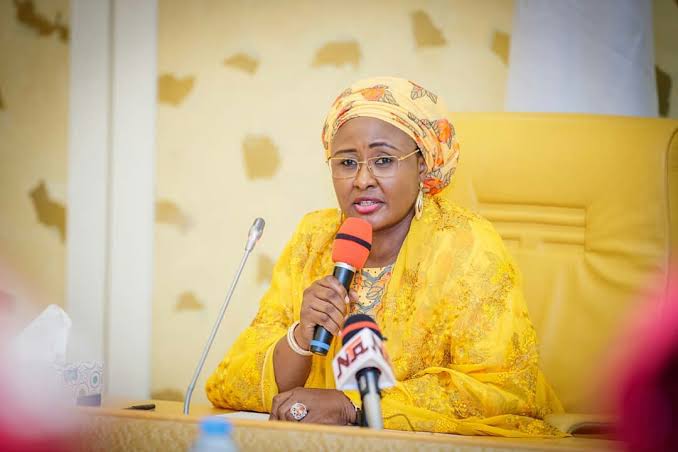The First Lady, Aisha Muhammadu Buhari, has regretted the low level of utilization of the over 10,000 species of medicinal plants in the country despite its huge need for production of drugs, cosmetics and other essential products.
She spoke Saturday at a Traditional, Complementary and Alternative Medicine (TCAM) conference organised by her office in collaboration with the Federal of Ministry of Health in Abuja.
She has, therefore, expressed the present administration’s commitment to boost commercial cultivation of such plant for health, economic and social benefits as well as for wealth and job creation for the teeming youths of the country.
Mrs. Buhari pointed out that TCAM has been recognized by the World Health Organization (WHO) as a very important healthcare service delivery system along side other practices such as Acupuncture and Ayurveda that have now been adapted from other countries for use in Nigeria.
According to her, this has provided other healing options apart from conventional medicine.
While noting that the conference was coming at a time when people were looking for alternatives and moving towards natural products, she added: “Nigeria is blessed with over 10,000 species of medicinal plants of which less than 20% are utilized. These valuable bio resources, often referred to as “Green Gold” can be harnessed for the production of medicines, cosmetics and other products for the benefit of our people.
“This Conference is in line with this administration’s agenda of boosting non-oil exports which will lead to the commercial cultivation of medicinal plants for health, economic and social benefits. It is with the sole aim for providing wealth and job creation for our teeming youths and women.
“The COVID -19 pandemic which crippled nations’ health systems, opened our eyes on the need to look inwards for possible remedies and brought to the front burner the importance of TCAM.
“It is widely known that during the pandemic, even before the discovery of the vaccine, people in Africa utilized their local herbs for the management of symptoms.”
The First Lady informed that the conference with the theme, “Nigerian Indigenous Medicinal Plants – Health Benefits and Economic Potentials,” was intended to showcase and recognize the nation’s local medicinal plants.
She hoped that its recommendations would lead to the implementation of the gradual integration of TCAM into the healthcare delivery system towards the achievement of Universal Health Coverage (UHC), prompt passage of the TCAM Council Bill to regulate the practice and products, and the establishment of a Vegetable, Fruit and herbs market for fresh produce, semi processed and raw materials for women.
Others objectives she wanted realized include land for women to cultivate medicinal plants and vegetables for their empowerment and training and re-training of practitioners and the protection of their intellectual property rights.
She advised wives of state governors to adapt the initiative and implement it at state levels while affirming that the Federal Government would continue to provide necessary and enabling environment for TCAM to thrive.
In his address, the Minister of Health, Dr Osagie Ehanire, assured that the Federal Government would facilitate the wide scale adoption of traditional and alternative medicine in orthodox medical practise.
While stating that traditional medicine was all that the nation had before the emergence of modern medicine just like other cultures, he noted: “The continued interest and research into traditional medicine is the right way to go for further development of these ancient herbs in Nigeria.
“The time has come to use the knowledge and skills of the forefathers passed down through the generations for greater value addition. In line with the aspiration of this administration to explore all avenues for proper healthcare, the Federal Ministry of Health will remain committed to supporting initiatives that promote TCAM in Nigeria.
“It is instructive that a high percentage of Nigerians still seek and use traditional medicine in addition to orthodox medicine. It is my hope that this conference would deliberate on opportunities that are hidden in traditional medicine to be adopted in our orthodox practise”
Prof. MacDonald Idu, a professor of Phytomedicine from the University of Benin, who gave the keynote address at the conference, said if properly harnessed, the value of traditional medicinal plants in Nigeria would hit N1 trillion by 2025.
He put the current value at a conservative estimate of N200 billion, regretting that not much attention has been paid to harnessing the sector.
“We talked about $200 billion. It is conservative. I’m serious. From other forms of literature, that I have also read is going to hit about 1 trillion by 2025. I know what that means. That’s a lot of money,” he said.
“Nigeria I’m sorry, we don’t walk the talk. We talk a lot, but we don’t really walk the talk. So my own point of interest is to drag the hearts of our people to realize that we should diversify our economy.
“We don’t have any reason to be poor. That’s the real truth. We don’t have any reason to report everything that we need to survive. It’s already here. Why do you have them here.
“So, I believe that if we’re able to set up that platform again, and then we’re able to organize ourselves and organize the traditional medicine practitioners and producers, we should be able to raise enough money for this country to move forward. That’s my worry actually,” Prof. Idu added.





